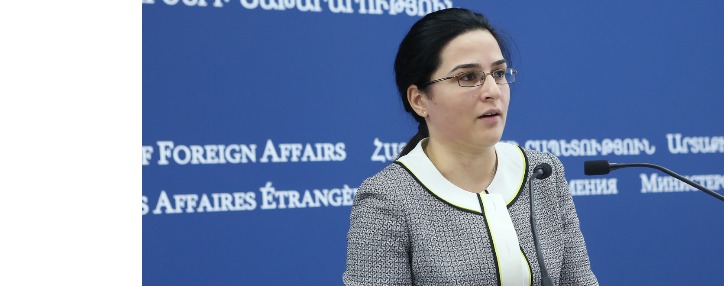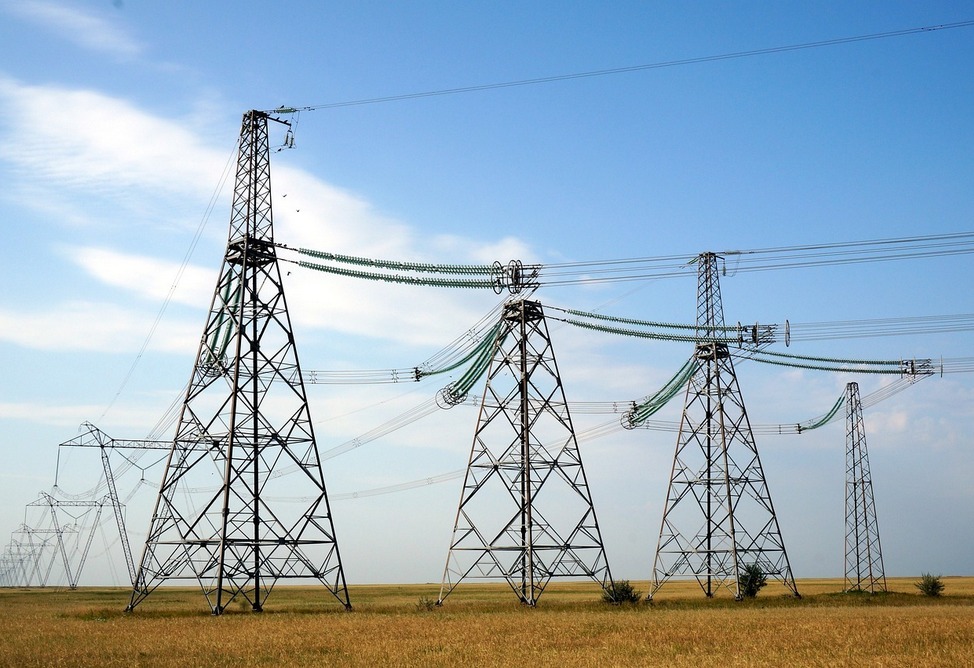Distorted perception of regional security by Azerbaijan and Turkey impedes peaceful resolution of conflicts, Armenian foreign ministry

YEREVAN, October 16. /ARKA/. Armenia's Ministry of Foreign Affairs has slammed today Azerbaijan and Turkey for what it described as 'distorted approaches and a perception of regional security, which are based on racism and discrimination', saying these impede the peaceful resolution of conflicts and help spur up instability in the region and beyond.
The remarks came from Anna Naghdalyan, the press secretary of the Ministry of Foreign Affairs, when she was asked to comment on a statement made by Azerbaijani president Ilham Aliyev that 'the transfer of Zangezur to Armenia resulted in a geographical split in the Turkic world'. She also commented on another statement by Turkish president Erdogan that Turkey would do everything possible to ensure the territorial integrity of Azerbaijan.
'"The President of Azerbaijan speaking at the 7th summit of the Cooperation Council of Turkic-Speaking States (Turkic Council) held the day before in Baku, once again repeated the claims regarding Armenia and the Armenian territories, this time, seasoning them with pan-Turkic accents," Naghdalyan said adding that "this all also underlines our priority in ensuring the security of the Armenian people in the region."
Naghdalyan also reacted to Erdogan’s statement that Turkey had not committed massacres of civilians in any of period of its history. "After the president of Turkey made an attempt last April 24 to justify the genocide committed against the Armenian people in their historic homeland , not a single statement on this subject is worthy of comment," she said.
The Nagorno-Karabakh conflict erupted into armed clashes after the collapse of the Soviet Union in the early 1990s as the predominantly Armenian-populated enclave of Azerbaijan sought to secede from Azerbaijan and declared its independence backed by a successful referendum.
On May 12, 1994, the Bishkek cease-fire agreement put an end to the military operations. A truce was brokered by Russia in 1994, although no permanent peace agreement has been signed. Since then, Nagorno-Karabakh and several adjacent regions have been under the control of Armenian forces of Karabakh. Nagorno-Karabakh is the longest-running post-Soviet era conflict and has continued to simmer despite the relative peace of the past two decades, with snipers causing tens of deaths a year.
On April 2, 2016, Azerbaijan launched military assaults along the entire perimeter of its contact line with Nagorno-Karabakh. Four days later a cease-fire was reached.
The Armenian Genocide is the first genocide of the 20th century. According to Armenian and many other historians, up to 1.5 million Armenians were killed starting in 1915 in a systematic campaign by the government of Turkey. Turkey has been denying it for decades.
The Armenian genocide has been recognized by dozens of countries. The first was Uruguay that did so in 1965. Other nations are Russia, France, Italy, Germany, Holland, Belgium, Poland, Lithuania, Slovakia, Sweden, Switzerland, Greece, Cyprus, Lebanon, Canada, Venezuela, Argentina, 49 U.S. states, except for the State of Mississippi. It has been recognized also by the Vatican, the European Parliament, the World Council of Churches and other international organizations.
Turkey and Armenia have no diplomatic relations; the border between the two countries was closed in 1993 by Ankara in solidarity with Azerbaijan. Relations between Armenia and Turkey remain tense because of Ankara’s biased stance on Karabakh problem and its painful reaction to Armenia’s efforts to obtain worldwide recognition of the Armenian Genocide, committed by the Ottoman Turkey during World War I.
In 2009, on October 10, Armenia and Turkey signed "Protocol on the Establishment of Diplomatic Relations" and the "Protocol on the Development of Bilateral Relations" in Zurich, Switzerland, which were to be ratified by the parliaments of both countries.
However, on 22 April 2010, then president of Armenia Serzh Sargsyan signed a decree suspending the ratification of the protocols, stating that Turkey was not ready to continue the process, since it became known that the protocols had been automatically removed from the Turkish parliament’s agenda.
Speaking at the UN General Assembly in September 2017 Serzh Sargsyan stated that Armenia never put the recognition of the Armenian Genocide as a precondition for regulating relations with Ankara.
Sargsyan said also that in the absence of positive progress on the part of Turkey, Armenia would declare them null and void in 2018 spring. On March 1, 2018 Serzh Sargsyan declared the Armenian-Turkish protocols void and null. --0--



